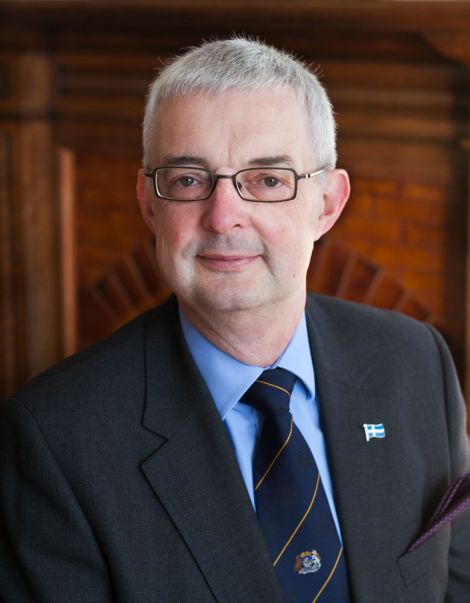News / SIC chief under fire over school closure decision
SHETLAND Islands Council chief executive Mark Boden is facing stern criticism over his role in the local authority’s decision to shelve proposed school closures – with one protester even claiming he ought to resign.
Last month Communities United for Rural Education (CURE) campaigners were celebrating after the local authority postponed consultations on shutting junior high schools for at least two and half years.
But some protesters remain angry that the SIC sought to sidestep a five-year moratorium on revisiting possible closures in Whalsay and Mid Yell by abandoning consultations prior to final reports being published and debated by councillors.
Had it completed the consultation exercises and elected members then voted to keep both open – as had been indicated behind the scenes – the two secondaries would have been safe from the closure threat until at least 2020.
The SIC’s decision effectively puts an end to any more consultations until the new Anderson High School opens in 2017. It is widely expected that closures will be revisited in some form after that.
But many parents feel the council did not abide by the spirit of updated legislation governing school closures – and former Aith Parent Council chairman Jeremy Sansom feels the “scale of this entire debacle is sufficient to warrant Mr Boden’s resignation”.
Scottish Rural Schools Network chairman Sandy Longmuir complained to the SNP Government, accusing the council of “flouting the law”, behaving in a manner that was “cynical in the extreme” and “overtly trying to subvert the clear democratic intent” of the legislation.
Boden last week defended the council’s decision in the local media, saying it had complied with the legislation.
One council source said it was “unfortunate” that it had been left up to Boden – rather than an elected councillor – to defend the local authority on BBC Radio Shetland.
Become a member of Shetland News
It put Boden – who unlike many of his predecessors has sought a low profile in the job – in an awkward position as chief executives are meant to avoid straying into politics.
But an incensed Sansom accused him of making “glib and supercilious remarks”, revealing he has “little appreciation of the gravity of the fiasco over which he has presided”, and said Boden must “bear the brunt of the responsibility”.
He felt the chief executive demonstrated “his ignorance of the impact his officers’ battering-ram policies have had on Shetland’s rural communities”.
“This is not a man who listens and neither do his officers in the education department,” Sansom said. “Their undisguised closure agenda has been unwavering from the outset, despite every effort of parent councils and community groups to be meaningfully engaged in the dialogue.”
On Wednesday, Boden told Shetland News that councillors had been “in full possession of the facts and understood the legal framework within which they were working” last month.
“I have not seen a reasoned argument as to what was wrong in law with the council’s decision,” Boden said, adding he viewed the legal issue as a “complete distraction”.
“Shetland Islands Council is interested in what the residents of Shetland – in this case the parents – want. If parents want something, just say what it is and why, and write to the council.” He did not want to respond to Sansom’s call for his resignation.
Late last week Scottish minister for learning Alasdair Allan said the SNP government expected local authorities to comply with the amended schools act “including the requirements regarding publishing a consultation report and observing a five year restriction on further consultation”.
He added: “I understand that Shetland Islands Council is reviewing its position to ensure that it complies with all the requirements imposed on it by the legislation.”
SNP Highlands and Islands list MSP Mike Mackenzie called for council leader Gary Robinson to “have a serious word” with Boden, claiming he is “playing fast and loose both with the public and with Shetland’s councillors”.
Both have “a right to know on what basis he is proposing to try and circumvent both the spirit and the letter of the legislation”, Mackenzie said.
However SIC convener Malcolm Bell robustly defended Boden, describing him as a “first class chief executive” who was “simply doing his job in explaining the council decision”.
Bell said the council had “considered and complied with the relevant legislation in this area”.
“Councillors took the decision to end the consultation process with all the facts presented to them, having regard to the particular circumstances of Shetland and the views expressed in the consultations,” he said.
An overwhelming majority of councillors felt it was not the right time to proceed with consultations. Instead they have asked the schools service to focus on getting the new AHS built, bedding in the curriculum for excellence and helping to establish the Shetland Learning Partnership.
In addition, Bell said, in a couple of years the SIC should have a clearer picture of what its financial settlement will be following this year’s Westminster election and 2016’s Holyrood poll.
“What’s important for people to understand is we’ve not said the consultations will re-commence in May 2017,” he continued. A subsequent report is likely to go before elected members shortly after the next set of council elections, and Bell said it “would be difficult to attempt tying the hands of a future council”.
“We’ve imposed a moratorium for the remainder of this council,” he said, “but the reality is it’s likely to be much longer before there are any further considerations on the school estate.”
Bell added: “We’re very keen to continue working with parent councils and developing a positive dialogue with them, and part of the reason for this decision was to allow that to take place.”
Become a member of Shetland News
Shetland News is asking its many readers to consider paying for membership to get additional features and services: -
- Remove non-local ads;
- Bookmark posts to read later;
- Exclusive curated weekly newsletter;
- Hide membership messages;
- Comments open for discussion.
If you appreciate what we do and feel strongly about impartial local journalism, then please become a member of Shetland News by either making a single payment, or setting up a monthly, quarterly or yearly subscription.






























































